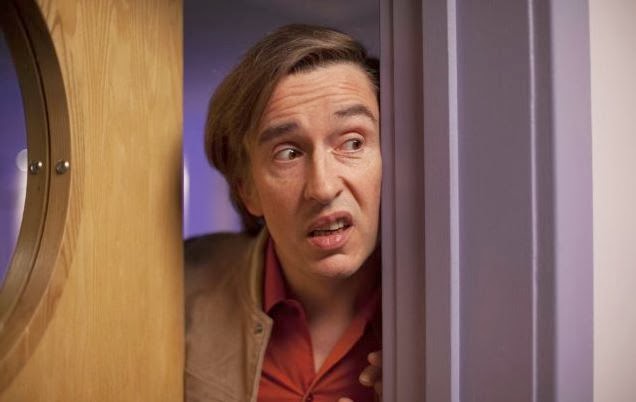A film like Maladies will have a hard time finding an audience. It was made in 2012, but not released until this week in 2014. I suspect it sat on the proverbial shelf for two years because distributors didn't know what to do with it in an era where even Noah is dressed as a super hero. Even the more discriminating film goers who enjoy smaller films are really looking for something cozy to do on a Sunday afternoon, something like Frances Ha, not a strange film like this one that jerks us around. That it stars James Franco, whose name has become shorthand for squandered talents, and is directed by someone known only as "Carter," probably made it a harder sell. But I'll say this: I liked it. In an era that doesn't appreciate experimentation, it dares to be different.
Franco is James, a former actor who now wants to write a novel and may be going a little crazy. He lives with his friend Catherine (Catherine Keener), who paints what appear to be Rorschach tests, and his sister Patricia (Fallon Goodson), who smokes a lot and may be a little crazy, too. James is paranoid, hears voices in his head, can't stand to to be touched, and can only calm himself by listening to the dial tone on a telephone. The voice in his head sometimes taunts him, sometimes engages him in a sort of philosophical argument. Sometimes, in an interesting touch, the voice in his head actually narrates the tale ("James is feeling bad now..."). There's a lonely gay neighbor named Delmar (David Strathairn) who worships James but doesn't dare do anything about it. He seems happy to just be James' neighbor.
Some reviewers have tried to link Delmar with the plays of Tennessee Williams, but I think Maladies owes more to the plays of Sam Shepard, the early ones when Sam was high on pills and writing six plays per week in Patti Smith's attic. Some of Shepard's old work, which was like Sam Beckett on speed, is embodied here in Carter's screenplay, as characters engage in weird conversations, repeat themselves, try on new personas, and occasionally go entirely off the rails. James, for instance, meets a blind woman, and then decides to write the rest of his novel in braille. That's a Shepardism, which is ok with me.
Life for James is growing increasingly difficult. He struggles to walk down a hallway, he spills things in stores, he's always on the verge of completely embarrassing himself. He wants to be a writer, and spends a lot of time expounding on the importance of his work, yet he can't decide whether to write with a pen or pencil. He's the sort of talkative idiot who likes the idea of being a writer but never sets anything down on paper. Meanwhile, Catherine has her own problems, including her compulsion to wear men's clothing and draw a pencil mustache on herself.
The film, though, for all of its gender bending and gay neighbors, is strangely asexual. It's as if everyone in the film is just too damned weird to think about sex. Delmar, for instance, may worship James, but he's too old to approach him as a lover. Catherine may dress like a man, but as Patricia tells her, it looks more like a costume than an organic expression of her inner self. James hates physical contact. There is a heartbreaking scene where everyone starts dancing to an old R&B tune, and Delmar can only look on, his eyes moistening. Is he weeping because he can never have James? I imagine that is so, but it doesn't matter. The scene is moving without needing an explanation.
The film, though, for all of its gender bending and gay neighbors, is strangely asexual. It's as if everyone in the film is just too damned weird to think about sex. Delmar, for instance, may worship James, but he's too old to approach him as a lover. Catherine may dress like a man, but as Patricia tells her, it looks more like a costume than an organic expression of her inner self. James hates physical contact. There is a heartbreaking scene where everyone starts dancing to an old R&B tune, and Delmar can only look on, his eyes moistening. Is he weeping because he can never have James? I imagine that is so, but it doesn't matter. The scene is moving without needing an explanation.
This sort of movie isn't for everyone. It bounces around in time - it appears to be set in the 1970s, but also looks like the early 1960s. It doesn't have any discernible plot, unless it's about the disintegration of a man's mind, and there's a lot of talk that doesn't seem to go anywhere. Yet, it's strangely affecting, partly because Franco is a charismatic actor, and partly because Carter does what a good filmmaker does - he creates a world with its own rhythms and dramas, and we accept it. Or we don't, depending on the viewer.
To be sure, Carter comes perilously close to being weird for the sake of being weird. Some of the experiments in narrative don't work. Some of the thoughts expressed in the film seem banal. But there's something in Maladies that lingers. The cinematography by Doug Chamberlain is beautiful, particularly when James is walking on the beach, or staring at a sunset. Chamberlain captures the coldness in the air, and it feels like the coldness in the characters. Maybe that's not enough for most people. Maybe most viewers will dismiss it as another of Franco's oddball career choices. But some may see the film as a good effort, something about people groping towards an ideal, and collapsing from the effort.















